- Home
- Claire North
The Gameshouse Page 27
The Gameshouse Read online
Page 27
“Well, it’s a disaster! My mother, my mother screaming—the government’s mobilising the army, do you know that? Not to catch you—at least, probably not to catch you—but because the PLA is massing on the south and the Russians are massing in the north and the border’s been closed and the mining companies are asking what’s going on and no one seems to know but it’s all about you, your game ruining my mother’s calm. And when she’s angry, I’m angry, and I have to take my anger out on someone, so if you’ve got someone you’re angry at, you should call them, right now!”
He slapped the steering wheel for emphasis, then clung on tight as a sudden, unseen lurch in the landscape bounced us in our seats. The motion seemed to knock the fury from his lungs, and for a while we rattled on in silence, our headlights tearing through the gathered dark like gunshots through silence.
“Can you get me across the border?” I asked at last.
“Sure—sure I can. I’m me, this is my country, these are my hills, I can do anything.” Then, as a sullen afterthought he added, “I’m a player in these parts, I am. I’m a proper player.”
The words, no sooner spoken, fell dull into the night.
We drove on in silence.
His plan for getting me across the border was a travelling family who, as the eldest woman shuffled me into her yurt, proclaimed through her toothless gums that they were of the Baatuds, an ancient and noble people who had been destroyed by other worthless tribes down the centuries until only a few now, only a few, carried their sacred songs and stories, and would I like coffee?
Batukhan babbled at high speed outside with the woman’s husband, a dialect I didn’t know, and when it seemed that an agreement might never be reached, the old woman rose up and hollered at them both in the same language and they hung their heads, and that seemed to settle the debate.
“They’ll get you into China,” said Batukhan as the woman padded round me and pushed me onto what I suspected was her finest rug. “Any problem, you don’t call me, okay?”
And with that, he was gone.
Impressions of a family travelling through Mongolia.
There were fifteen of them. Grandpa Baatud (nominally in charge), Grandma Baatud (mistress of all she surveyed), two sons and their wives, a daughter and her husband and seven progeny. The eldest of this brood was a boy of fourteen, his face scaled red by the wind, who rode a brown and white pony and glared with a fire that his father lacked, daring anyone to deny his right as eldest, strongest, smartest—a little man in a tiny world. The youngest was a four-year-old who stared at me with astonished eyes and, over the course of the five days I spent with them, only once dared touch me, and having done so clung on, as if unbelieving that I might not dissolve before her. I let her cling; the strength of her arms around my leg reminded me of… something. Something distant which had faded. Something that might have been like trust, but more. Something more, which had vanished with my name.
They rode a mixture of ponies and sour-faced camels. They travelled with two yurts, which could be raised and lowered in a matter of hours, the fine-boned internal structure whisked away and the thick skins that covered it unfurled almost too fast to follow motion; yet the ropes that bound these goods to their animals’ flanks were bright blue, nylon-woven, and as she trotted along, one of the middle daughters, an eleven-year-old who looked at no one, finding no one interesting, kept checking text messages on a mobile phone which was recharged from a solar battery the size of a small frying pan. This heavy object seemed indulgent for just one teenager to use for her social needs as we travelled through this empty land, but lo, when we stopped for food on the second day, out it came and her brothers and sisters leapt to charge their devices while Grandma looked on and said it was the school holidays, and the children did miss their friends when away.
I said nothing, swaddled in a loaned jacket, hat pulled low against the glare of the sun, the grumbling camel beneath my folded legs burping toxic gases in sulky criticism of my presence on its hump.
We ate dishes enriched by camel butter, and drank hot cups of camel milk. The husbands and sons sang songs at night, tales of ancient battles and dead witches, whose contents I barely understood, while their children sat around to listen, the youngest agape, the eldest silent in the face of unappreciated repetition.
Once, a military fighter plane flew over, and during the three hours that followed, I heard engines higher in the clouds. One of the sons declared he knew it to be Chinese by the sound, having served in the Mongolian army, whereupon the second son laughed and said his brother couldn’t tell the difference between a vulture and an eagle, let alone a Chinese or a Russian jet, and he was to stop boasting about his time in the army, given he’d only served for three months before being dismissed as unfit for duty. Then the eldest son flushed red and said at least he’d served, at least he’d travelled, and an argument broke out between them, silenced at last by Grandma who proclaimed that they were giving her a headache and didn’t they know better than to put her into one of her moods?
It seemed they did, and they fell silent.
Grass dried, thinned, failed.
We swathed ourselves in bright fabric dulled by sunlight, wrapping it around our faces, our fingers, our clothes, barrier against the dust and the sun. My eyes burned, skin flaking from the lids. My face, even shielded, began to crunch to the lizard-like redness of my companions. I craved water, but drank only when they did, obeying their rules, knowing their rules had been formed to survive. The daughter stopped texting after a while; the dust took the inclination from her. I wondered what she might have said? DESERT SUCKS SO BORED ATM. CAN’T WAIT TO GO BACK TO SCHOOL
I laughed out loud thinking about it, and the convoy stared at me and I laughed no more.
On the fifth night, as the fire blazed in the centre of the camp, and the men sat round boasting of impossible deeds while camels churned and ponies slumbered, I saw shapes move on the edge of the dark and, fearing the worst, made to run. Then the shapes resolved into the form of the women and their daughters, moving against the edge of the starlight, and creeping further, I saw hands sweeping across the turning skies, and heard soft voices whispering secrets, and strained my ears to catch some few words of the truths being told there.
By this star you may find north, whispered a mother, and by that you may know how far you are from dawn in winter. When you head south, you will see this constellation grow brighter, and may count the hours by the turning of this light as it journeys through the heavens. Remember these lessons, they whispered, for one day you may find yourself lost and alone in this land, far from friends, and only the earth beneath your feet, the water of the rivers and the rains of the skies, the journey of the sun, the shriek of the eagle as it returns to its nest and the turning of the stars will guide you. Believe in these, believe in yourself, and you will always find your way home.
The next morning, without any ado, as we travelled in silence across a plain of yellow dirt, Grandpa Baatud half turned in his saddle to look back at me and said, “This is China.”
“Is it?” I looked for sign of life, a change in the land, an appearance of people, but the landscape was as empty as it had been, the sky as wide.
“Oh yes,” he replied merrily. “We’ve been in China for a while now. You can tell by the smell.”
I sniffed the air and smelt nothing new.
Two days later, we came to a village in the middle of yellow sand and white rocks whose name translated as something akin to “The Beginning of the Sun Near the Death Tree”, and whose inhabitants, all two hundred and twenty-nine of them, had the same sun-blasted, sand-scraped, wind-scrubbed features as my guides. I looked for signs of a police station and saw none. I looked for a military presence and saw none. I wrapped myself in my scarf, buried my face in my hat and asked in Mandarin if there was anywhere I could stay. Eventually, the mayor of the town, a man who had more than a little of the Mongol in him, put me up on his sofa, which was in his bedroom, which
was his house, and refused any payment for his kindness.
Alone, in a nowhere place, in a nowhere land.
Grassland had yielded to dust. Desert is not merely a place of dunes but of dryness, of solid packed earth and dust, of stones and rocks and flatness that will not be dug, sky that does not forgive. I asked the mayor why there was a town here.
“There was copper,” he said sadly, “but that was a long time ago.”
So it had been; yet it was no more. I did not ask further.
The nearest town was four hours’ drive away.
I caught a lift on the back of a truck loaded with rubble.
“It’s all we sell,” explained the driver. “People seem to find a use for it. Why are you here?”
“Just travelling.”
“No one travels here,” he replied. “Here is death.”
“Everyone travels to death sooner or later,” I replied with a smile. “In one way or another.”
He stared at me in surprise, then turned away and looked for a brief moment like the loneliest, saddest man in the world.
The next town had a population of nine hundred and thirty-three, and a market on Thursdays, and the last gasping remnants of a mine nearby. It even had a guest house with four rooms and a visitor balcony. I sat on a wobbly plastic chair on the balcony watching the dust rise from the mine nearby, smelt chemicals on the air, heard the grinding of great machines tearing through the earth.
It had been over a week since the Gamesmaster plastered my face on Mongolian TV. Will she have the power to plaster it on China’s networks too?
I watched TV on a tiny black and white set in my little, roach-crawling room, and saw no evidence of this. One computer in the town had an internet connection, and after a great deal of bartering with the man who owned it (something middling in the mining corporation) I secured twenty minutes on it, watching the system crawl into reluctant life.
My face, it turned out, was not on the Chinese evening news, but the Interpol search warrant had somehow evolved into a thing that had both the Russian and Chinese police forces excited at the idea of finding me. The FBI, I was relieved to see, had yet to join in with this mania—clearly my control of that institution still exceeded the Gamesmaster’s.
Twenty minutes on a computer was not enough to wreck any real havoc against this exasperating move, so I deleted my internet history, shut down and moved on.
There was a bus to the next nearest town, population fifteen thousand. As we drove through the desolate landscape, I looked out of the window to see machines bigger than swimming pools crunching through solid rock, great axels like tearing teeth rending the earth into shreds, men walking along gantries within these creatures’ bellies, dust flying, flying all around, turning the windows of the cramped bus grey.
Ten miles outside town, the bus stopped at a road marking in the middle of nowhere, a place with no name, and a man got on. I looked at him and he looked at me, and I thought I recognised in him a thing that I did not like and looked around at my fellow passengers to see if anyone else had that instinct, and at least three or four had turned away.
On our arrival in the swollen red dusk, at a bus station that smelt of urine and rotting eggs, I got off, and the man who’d boarded ten miles ago got off with me, walked up behind me, drew a gun from the holster underneath his black padded coat and a badge from inside the pockets of his trousers and said, “Stop, please.”
I stopped, turned, faced him, clinging to my meagre bag, watching his hands, his face, his body. He held the gun but his features showed no expression.
“Show me your face please.”
He had already seen enough to make a decision, but I pulled my hat from my head, my scarf from my mouth. He considered all these, taking his time, a man confident in his skill set and his judgement, before saying, “Please face the wall. Do not turn around until ordered.”
“Am I under arrest?” I asked.
“Yes. You are under arrest.”
“For what crime?”
“Travel through a military zone.”
It was a lie but one he turned out so easily that clearly it had been tried and tested a dozen times before, and not yet been found wanting. I hesitated, still facing him, and at my doubt, he raised the gun a little higher. “Please face the wall.”
I obeyed.
“Do you have a passport?”
“Not on me.”
“Where is your passport?”
“In my hotel.”
“Where is your hotel?”
“Beijing.”
“What is your name?”
“David Fields.”
“Please come with me.”
“Why?”
“You are under arrest.”
“Where are we going?”
“The police station.”
“May I call my embassy?”
“At the police station. What is your nationality?”
“Canadian.”
“You may call your embassy from the station. Please come with me.”
I considered my options and, remembering that a king may be put into check by a pawn, obeyed. He took my bag, handcuffed me and led me away, one hand on my arm, a simple man conducting a simple arrest.
Chapter 24
The police station had two cells, one office, and one other constable in it.
On seeing me, he exclaimed, “What the hell is this?”
My eager captor pushed me into a wooden chair that creaked uneasily beneath me and made no answer, stepping round his junior colleague instead to play with the computer, which was possibly even older and even clunkier than the one I’d borrowed in the mine manager’s office. I waited, listening to the hum of the fluorescent tubes overhead, the slow thunk-thunk-thunk of a broken extractor fan, smelling the bleach on the tiles in the tiny bathroom, the old cigarettes stubbed out in an aluminium ashtray. Finally the policeman found the picture he was looking for, and conferred with his colleague and at last straightened up, walked round the desk, pulled me by the arm to face the screen and said, “Do you deny that this is you?”
I looked and saw my own face, beautifully rendered mug-shot style—though I had no memory of posing for the photo—and a list of crimes that range from the banal to the impressively imaginative.
“It’s not me,” I replied. “I don’t know who that is.”
“Do you deny that this is your picture?”
“I do. I do deny it. I would like to call my embassy. My name is David Fields. My embassy will confirm it.”
Another debate ensued at this. Finally I was pushed back into my chair, and a phone was passed to me, the number already dialled. “You have two minutes to speak to your embassy.”
I waited for the phone to be answered.
“Hi,” I said in French to the attaché who eventually came on the line. “This is David Fields. I’m in a bit of bother.”
The two policemen glanced at each other uneasily—French was clearly a language beyond their comprehension.
“David… Fields, was it?”
“That’s right.”
“I can see your file right here, Mr. Fields, sir.”
“Could you get onto the relevant parties, please? I’m in… where am I?”
“Huanshi Lu,” grumbled my captor, when asked in Mandarin.
“You got that?” I asked the embassy.
“Huanshi Lu—yes, sir. Are you injured in any way, Mr. Fields?”
“No. But you probably have less than three hours to get to me before I sustain terminal injury.”
“I’ll be right on it.”
“Pull out all the stops on this one—I’m in serious trouble.”
“Absolutely, sir. We’ll have something with you imminently.”
“There’s a danger they’ll try to move me.”
“Procedures are already being activated, sir. We’ll have you out before you know it.”
“Thanks.”
“A pleasure, Mr. Fields sir—a pleasure.”
He hung up and the policemen reluctantly put the phone back on the receiver.
“Your embassy didn’t want to talk to us?” demanded the senior officer.
“No,” I sighed. “You’re only pieces in this game, I’m afraid. My friends are going to look rather higher.”
They threw me in the cells.
I could hear the sound of voices on telephones for an hour after they locked me up, and praised inefficient bureaucracy for getting in the policemen’s way.
After an hour the telephones stopped, and silence fell.
I waited.
After two hours and two minutes, the phone rang, just once.
I couldn’t hear the conversation that followed, but when it ended, silence again.
Then voices, raised in argument. Junior arguing with the senior. That took nearly twenty minutes. When they were done, the two policemen came into the cellblock. They now wore bulletproof vests, riot helmets, and carried guns.
“Up!” barked Senior, and I got up.
They handcuffed me, rougher than they had been, and pulled me from the station, turning the lights off behind them. They put me in the back of their one, unmarked, battered beige car, Junior keeping his gun trailed on me all the way, and in the dead of night, headlights rippling against dust, began to drive.
“Where are we going?” I asked, and, “Shut up!” was the only reply I received.
I sat in silence as the town receded behind us, and at last said, “Do you have orders to kill me?”
“Shut up, shut up!”
I looked sadly from one man to the next and saw terror, gut-clenching, soul-biting terror in them.
“It’s okay,” I said. “It’s okay. It’s only a game.”
Five miles outside the town, they pulled off the one, arrow-straight road onto a dust track that led nowhere at all. Two miles further on from that, they stopped, and Junior pulled me out of the back and pushed me into the glare of the headlights, and then pushed me further and a little further still, until I hovered on that dead place where light loses shape and spills into shadow. Then he forced me to my knees and levelled his gun against the back of my head, and shook and shuddered, and did nothing.

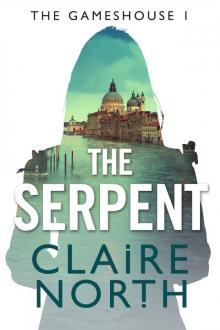 Gamehouse 01 - The Serpent
Gamehouse 01 - The Serpent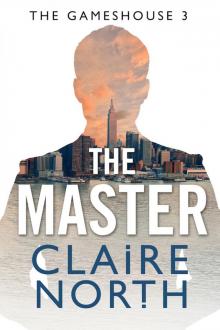 The Master
The Master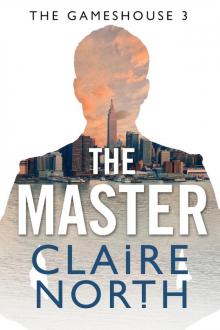 Gamehouse 03 - The Master
Gamehouse 03 - The Master The Thief
The Thief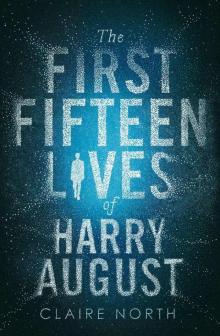 The First Fifteen Lives of Harry August
The First Fifteen Lives of Harry August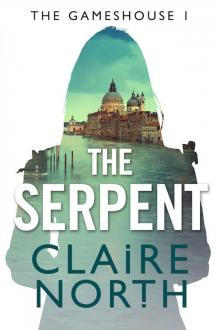 The Serpent
The Serpent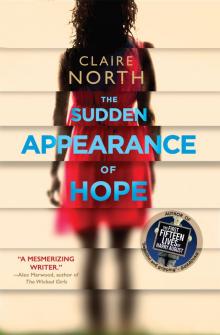 The Sudden Appearance of Hope
The Sudden Appearance of Hope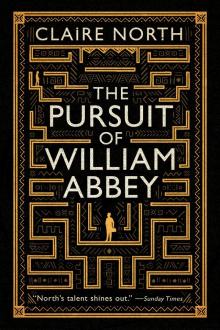 The Pursuit of William Abbey
The Pursuit of William Abbey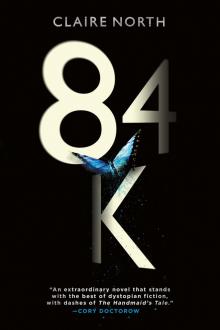 84k
84k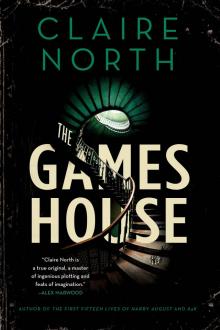 The Gameshouse
The Gameshouse Touch
Touch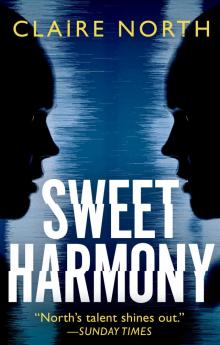 Sweet Harmony
Sweet Harmony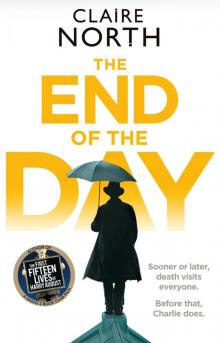 The End of the Day
The End of the Day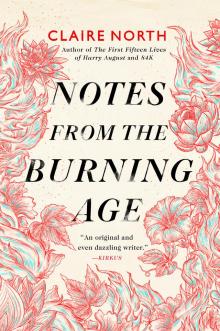 Notes from the Burning Age
Notes from the Burning Age